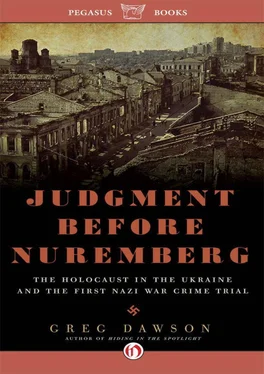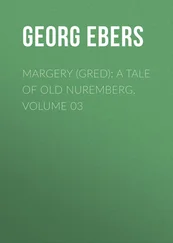Hitler’s paternity of the aggressive war and its atrocities did not absolve the implementers of his criminal vision, Dunayev said. He cited the Washington Treaty of 1922 on piracy and its principle that a service member is not immune from trial and punishment if he commits a crime, even if he was following orders from a superior.
“Numerous orders of the Hitlerite government and military prescribe actions which are, manifestly and beyond doubt, major crimes and flagrant violations of international law,” Dunayev told the court. “The German servicemen who set fire to peaceful towns and villages, who shoot civilians, who force women, the aged, and children into burning houses cannot but know that such actions constitute a travesty of international law and the laws of all civilized countries.
“The former servicemen of the German Fascist Army who are today in the docks are criminals, and must bear deserved punishment for the criminal offenses they have committed. The evidence of unheard-of crimes committed by the base Hitlerite is not far away, citizen judges. It is in the suburbs of Kharkov, in the forest park, on the territory of the tractor plant, and in many other places converted by the fascist hangmen into the ghastly graves of victims in tens of thousands.
“I appeal to you, citizen judges, to inflict severe punishment on the three base representatives of fascist Berlin, and on their abominable accomplice, to punish them for their bloody crimes, for the sufferings and the blood, for the tears, for the lives of our children, of our wives and mothers, of our sisters and our fathers. Today they are answering to the Soviet Court, to our people, to the whole world, for the felonies they committed on a scale and of a baseness far surpassing the blackest pages of human history. Tomorrow their superiors will have to answer—the chieftains of these bandits.
“In the name of the law and of justice, in the name of tens of thousands of people maimed and tortured to death, in the name of the entire people—I, as state prosecutor, beg you, citizen judges, to sentence all four base criminals to death by hanging.”
Dunayev’s request for the death penalty unleashed raucous applause from the onlookers. The defendants’ stateappointed counsel pleaded for mercy—something they had denied their victims—offering arguments and mitigations which sound lifted from a trial on Court TV. The Germans were products of their environment and a “monstrous” system of education, argued N.V. Kommodov. “These men were made into assassins by killing their souls, and it is this doubt which gives me, comrade judges, the moral right to pose the possibility of a lesser penalty than that demanded by the prosecutor.”
Counsel S.K. Kaznacheyev spoke of Retzlaff, 36, as if he were the member of a teenage biker gang in need of rehab, not hanging, asking the court to consider that he “served in an army of bandits where human feelings were considered a weakness, and ruthlessness and fanaticism a virtue.” He asked the court to spare the confessed killer’s life because he was “conscious of what he has done and has undergone a psychological transformation.”
Finally, the accused were given the opportunity to address the court. Langheld asked to be spared because he was old, Ritz because he was young, Retzlaff so he could return to Germany to “open the eyes of the German people to Hitlerite propaganda.” Bulanov simply begged for mercy. All the defendants admitted their crimes but said ultimate responsibility belonged to those who ordered them to kill. Langheld played the victim card, eloquently.
“I flogged Russian prisoners of war,” he said. “I issued orders for them to be shot. On my orders, civilians were arrested and subsequently shot. But… I am not the only one. The whole German Army is the same. I was not the only one to perpetrate atrocities. I do not want to minimize my guilt in any way but… the underlying reasons for all the atrocities and crimes of the Germans in Russia are to be found in the German government.
“The Hitlerite regime has succeeded in stifling the finest feelings of the German people by implanting base instincts in them. One might quote the words of a German poet: ‘Accursed evil in its turn engendering evil.’ This evil found expression in the orders and directives of the higher German military authorities. To fail to carry them out would have meant to sentence oneself to death. I was also the victim of these orders and directives.”
Ritz, in a rambling mea-not-culpa, told the court he did not want to minimize his crimes—“an atrocity remains an atrocity”—then attempted to minimize them by telling the judges that he derived no “satisfaction” or “gratification” from the murders he committed. (“I was acting on orders.”) He pleaded that he was “a child of only thirteen” when Hitler came to power and had been subjected to relentless Nazi propaganda. Like Retzlaff, Ritz claimed a death-bed conversion from his ardent embrace of Hitler’s mission to exterminate the “uncultured and inferior” Russian people. He had lived and learned.
“When I reached the Eastern Front I was convinced that there was not a word of truth in these fables of Hitler, Rosenberg, and the others,” Ritz said. “I realize that destruction of this system would be an act of justice. I request you spare my life so that I may devote myself to the struggle against that system.”
Stevens, who was in the Opera House for the final day, wrote that Ritz’s plea “thawed none of the ice in the court. Every face in that room outside the prisoner’s box wore the same expression of hatred and contempt that signified too clearly ‘thumbs down!’ There was no room for mercy in that surcharged courtroom. It was crowded out by the unseen audience of uncounted thousands of tortured and massacred Ukrainian men, women, and children whose blood the defendants and others like them had shed.”
After hearing the final pleas, the judges retired to deliberate, but there was little suspense. Everyone in the courtroom knew what was coming, Stevens wrote. “Most of them had seen the gallows being erected in the center of the marketplace.” Around midnight, the judges returned. The presiding judge, Major-General A. Myasnikov, read the verdicts—detailing the crimes of each man—and the sentences.
“During the temporary occupation of the city and region of Kharkov, the German fascist invaders shot, hanged, and burned alive, or asphyxiated by means of carbon monoxide, more than thirty thousand completely innocent Soviet civilians including women, old folk and children… deported into German slavery hundreds of thousands of Soviet citizens… pillaged, burned and destroyed the material and cultural treasures of the Soviet people,” Myasnikov summarized.
“On the basis of Article 296 of the code of criminal procedure of the Ukrainian Soviet Socialist Republic and the decree of the Presidium of the Supreme Soviet of the U.S.S.R., the Military Tribunal of the Front sentences William Langheld, Hans Ritz, Reinhard Retzlaff, and Mikhail Petrovich Bulanov to death by hanging. The verdict is final and not subject to appeal.”
The Opera House erupted in applause. “Bulanov and Langheld seemed on the verge of collapse,” the New York Times reported. “Both were led from the hall by guards. Ritz started to cry when the demand for death sentences was being translated into German.” This was puzzling. The court had simply granted Ritz’s wish not to minimize his crimes.
At the conclusion of Eichmann in Jerusalem , her brilliant meditation on the trial of Final Solution facilitator Adolf Eichmann, Hannah Arendt offers her own sentencing statement to the convicted Nazi. It was almost as if she were addressing the Kharkov defendants. In her peroration, Arendt addresses Eichmann:
Читать дальше












